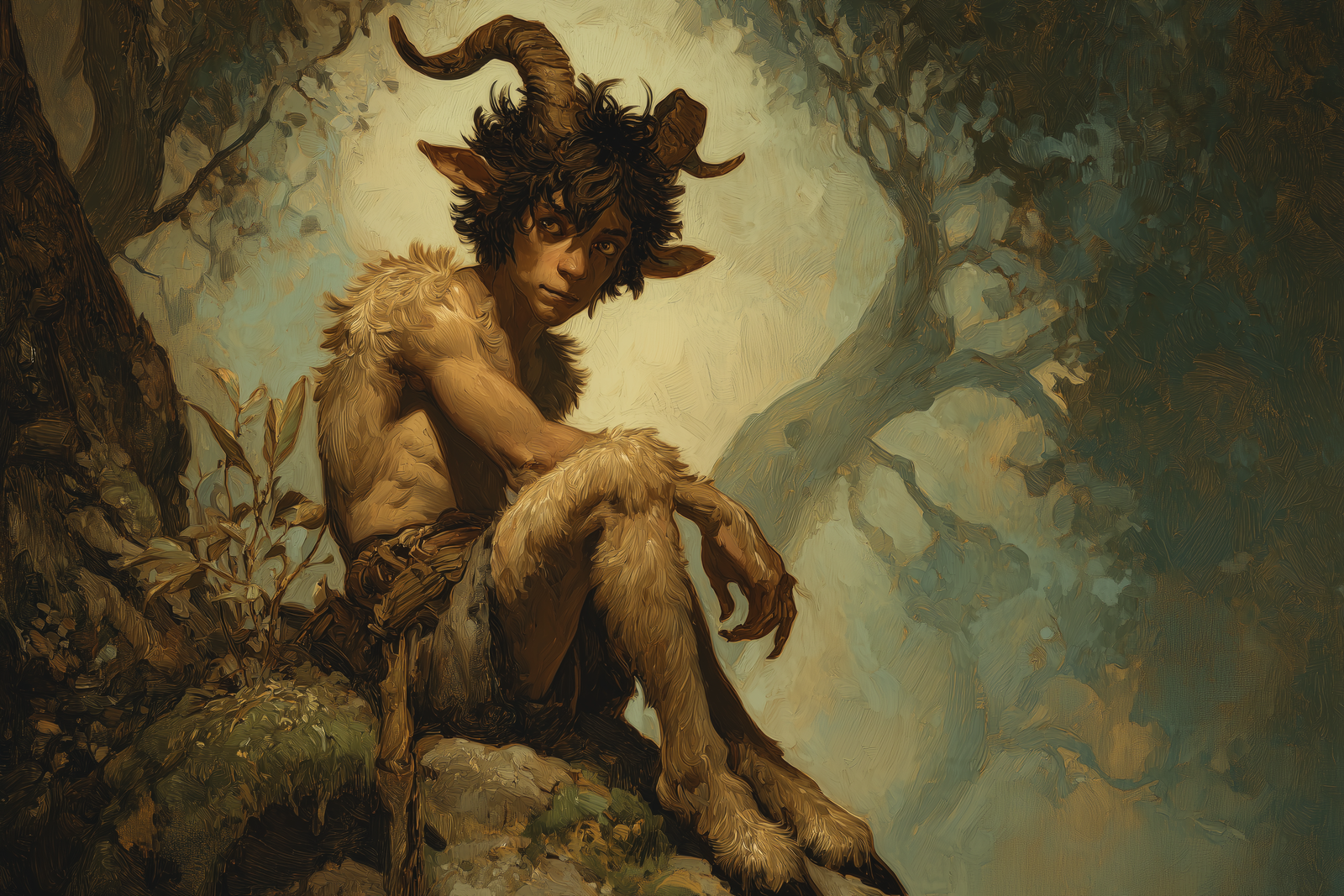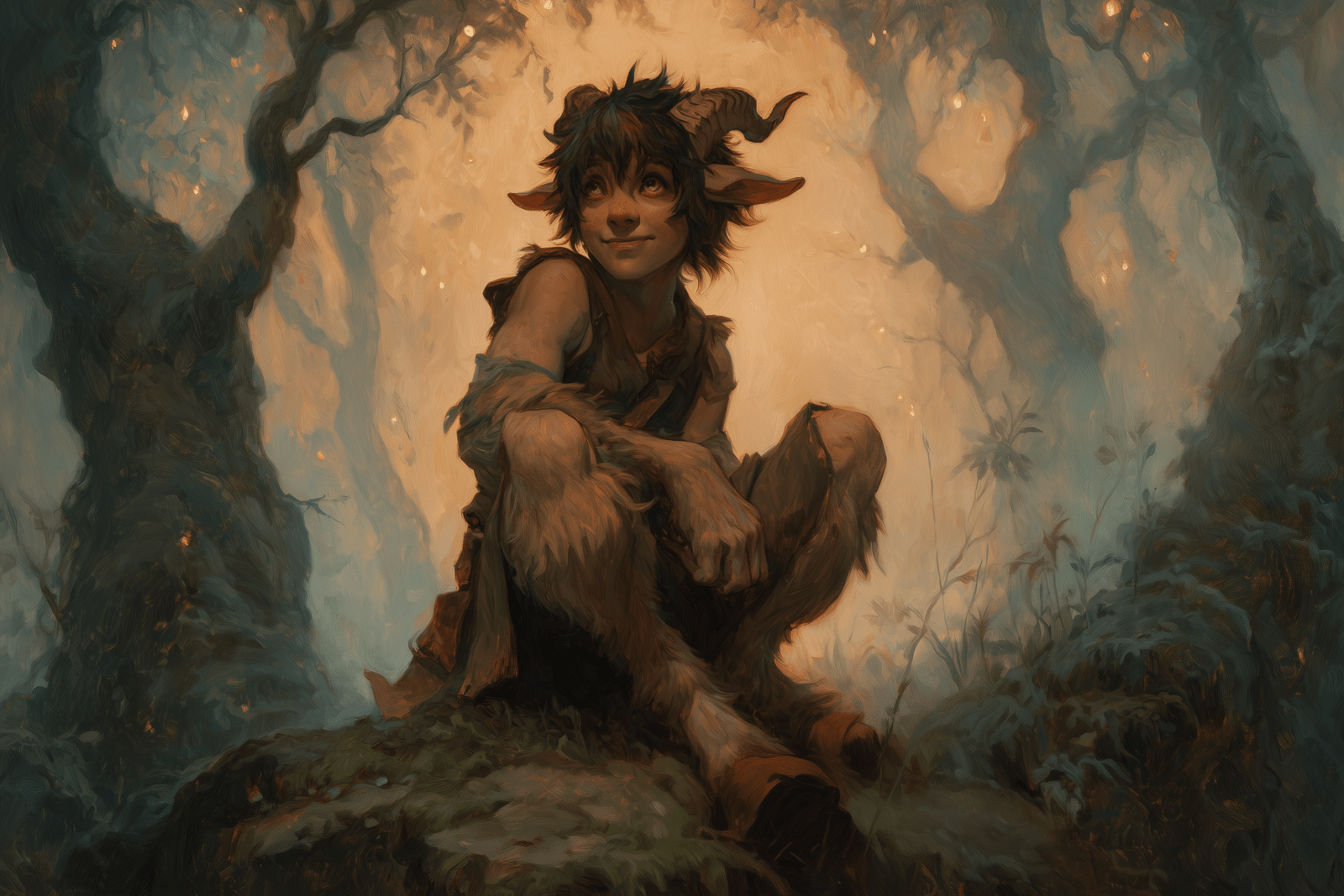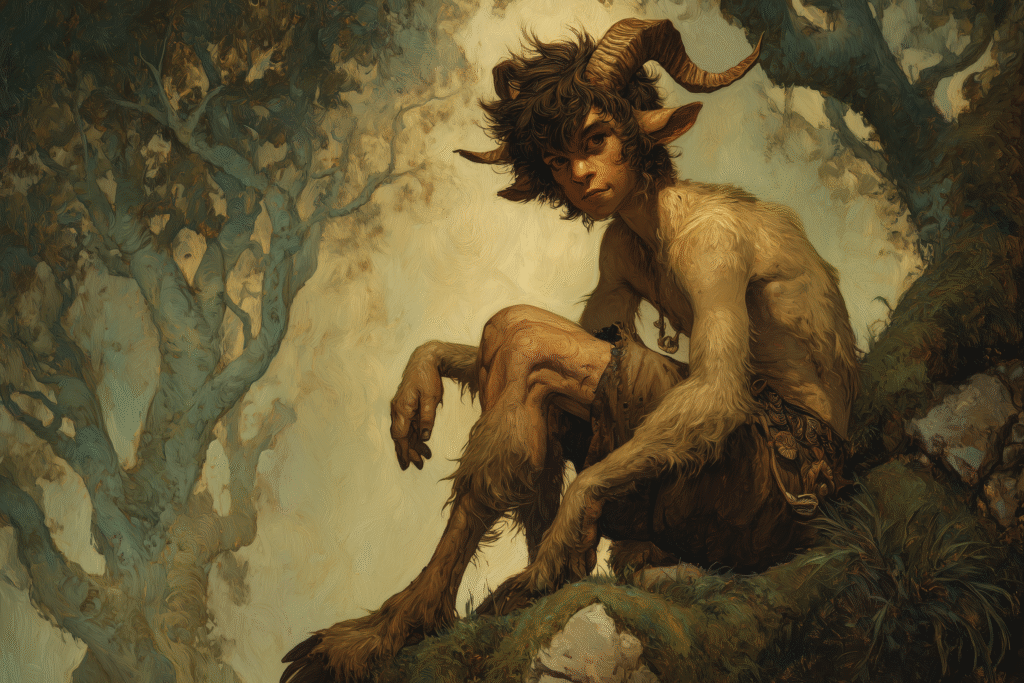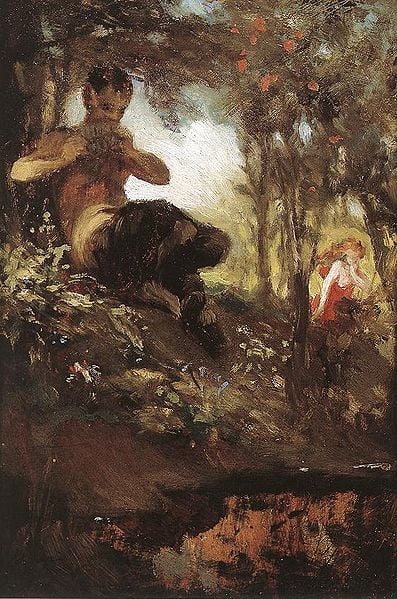“Faun: The Enchanting Horned Reveler of the Wilds”
Graceful, horned fey of music and mischief, Fauns embody the wild heart of the forest—half-goat revelers whose laughter can bless or doom those who wander too deep.

Fauns are enchanting woodland spirits that blend mortal beauty with the primal essence of nature. With goatlike legs, curling horns, and eyes gleaming with playful cunning, they dance through moonlit glades playing flutes and spreading both joy and confusion. Known as tricksters, lovers, and guardians of the wild, Fauns lure travelers with haunting melodies, test mortals with riddles, and protect their sylvan realms through illusion and charm. Neither wholly benevolent nor cruel, they serve the balance of nature—wild, untamed, and forever free.
Appearance
Fauns are lithe, humanoid beings with the lower bodies of goats—furred legs ending in nimble cloven hooves—and the upper torsos of handsome mortals crowned with curling horns. Their amber eyes gleam with mischief, and the scent of crushed herbs and wild wine clings to their skin. They often wear garlands of ivy or flowers, carrying flutes or pipes carved from elderwood.
Behaviour
Playful and unpredictable, Fauns live for the thrill of music, dance, and delight. They are fond of riddles, pranks, and harmless trickery, yet can turn fierce when their woodland kin or revels are threatened. Beneath their carefree exterior lies an ancient cunning—an instinctive understanding of both pleasure and peril.
Habitat
Fauns dwell in deep sylvan glades, mossy hillocks, and along the borders of enchanted realms where mortal lands blur into fey dominions. They favor secluded forests alive with birdsong and running water, often marking their territory with faint melodies that drift on the evening wind.
Modus Operandi
Rather than direct combat, Fauns rely on charm and illusion. They use mesmerizing music and laughter to bewitch intruders, disarm foes, or lead hunters astray. When pressed, they dart through trees with supernatural agility, striking from cover or calling upon woodland allies to defend their groves.
Motivation
Fauns seek joy, freedom, and balance in the wild rhythm of nature. They revel to honor forgotten forest gods and ensure the vitality of their domains, but also act as stewards of the untamed—guarding ancient secrets from those who would despoil them.
Faun 5e 2024
Faun, Pathfinder
Faun

Medium Fey, typically Chaotic Good
Armor Class 13 (natural agility)
Hit Points 45 (10d8)
Speed 35 ft.
| STR | DEX | CON | INT | WIS | CHA |
|---|---|---|---|---|---|
| 10 (+0) | 16 (+3) | 12 (+1) | 11 (+0) | 14 (+2) | 17 (+3) |
Saving Throws Dex +5, Wis +4, Cha +5
Skills Performance +7, Persuasion +5, Nature +2, Stealth +5
Senses Darkvision 60 ft., Passive Perception 12
Languages Sylvan, Common, Elvish
Challenge 2 (450 XP)
Proficiency Bonus +2
Traits
Innate Spellcasting (Fey Magic).
The Faun’s innate spellcasting ability is Charisma (spell save DC 13). It requires only its music or gestures to cast these spells:
- At will: druidcraft, minor illusion
- 3/day each: calm emotions, charm person, faerie fire
- 1/day each: suggestion, sleep
Musical Enchantment.
When the Faun plays its pipes, each creature of its choice within 30 feet that can hear it must succeed on a DC 13 Wisdom saving throw or be charmed for 1 minute. While charmed in this way, the creature is incapacitated and must use its movement to dance in place. The effect ends if the Faun or any of its allies harms the creature or if the Faun stops playing.
Forest Step.
The Faun can move through nonmagical difficult terrain caused by plants without extra movement cost. While in natural terrain, the Faun can take the Hide action as a bonus action.
Bounding Step.
When the Faun moves at least 10 feet before making a melee attack, it can jump up to 10 feet as part of that movement without provoking opportunity attacks.
Fey Resilience.
The Faun has advantage on saving throws against being charmed and against magic that would put it to sleep.
Actions
Hoof Kick. Melee Weapon Attack: +5 to hit, reach 5 ft., one target. Hit: 7 (1d8 + 3) bludgeoning damage.
Flute Bolt (1/Turn). Ranged Spell Attack: +5 to hit, range 30 ft., one target. Hit: 9 (2d8) psychic damage as a burst of piercing melody reverberates through the target’s mind.
Panpipe Melody (Recharge 5–6).
The Faun plays a magical tune that fills a 30-foot radius sphere centered on itself. Each creature of the Faun’s choice that can hear it must succeed on a DC 13 Wisdom saving throw or be charmed or frightened (Faun’s choice) for 1 minute.
- A charmed creature dances harmlessly and is incapacitated.
- A frightened creature flees from the Faun by the safest available route.
A creature repeats the saving throw at the end of each of its turns, ending the effect on itself on a success.
Reactions
Forest Veil.
When a ranged attack targets the Faun in wooded terrain, it can use its reaction to gain half cover until the start of its next turn, as shifting illusions and foliage obscure its form.
Tactics
Fauns prefer charm, misdirection, and mobility over brute force. They begin combat with faerie fire or Panpipe Melody, then use calm emotions or suggestion to divide foes. In battle, they weave in and out of cover, exploiting Forest Step to vanish between trees. If threatened, they disengage gracefully, often leaving a haunting laugh echoing through the woods.
Description
Fauns are joyful fey who embody the spirit of unrestrained nature—half-goat musicians whose laughter and song fill the forest with life. They celebrate freedom, dance, and love beneath moonlit canopies, guiding lost travelers toward revelation—or ruin. Though often playful and kind, Fauns fiercely protect their woodland homes, defending the balance between mortal intrusion and fey wonder.
Faun

This capricious figure has the upper torso, arms, and head of a man, but goatlike legs, a tail, and curling horns on his head.
[This content was created for the Pathfinder rules by Paizo Publishing LLC and is part of the Pathfinder RPG product line.]
Often mistaken for satyrs, fauns are far more benevolent than their unpredictable cousins. Many people use the two names interchangeably, a fact that irritates both fauns and satyrs. The vast majority of fauns are male, although unlike satyrs, females of this species do exist – they’re simply less common than male fauns.
While satyrs breeding with their seduced victims always produce full-blooded satyrs, fauns are the result of a willing pairing between satyrs and goodly fey or kindhearted humanoids such as humans or elves.
Even in this case, the babies of such unions are usually stolen away and raised by their fey parent or some other sylvan foster family. Like satyrs, fauns enjoy wine, music, dancing, nature, and carnal pleasures. Gentle hedonists, fauns also have a dedicated connection to the countryside, helping hardworking humanoids who make peace with the land and take little more than they need. They help these frontier folk by fighting off significant threats and keeping less savory fey creatures away from their settlements. While they prefer to go unnoticed, in dire times a band of fauns may present themselves to villagers to warn their neighbors of an upcoming threat.
Fauns find nymphs exceptionally attractive, more so than all others who dare view them. Nymphs find beauty in fauns’ good nature and steadfast dedication to the natural world, and often humor their advances before almost accidentally falling in love with them.
As tall as a human, a faun stands on stark white goat legs and has short horns protruding from its head. It also has a short tail that swishes playfully when it is excited or entertained, and its hair falls gracefully around its horns and ears. Its humanoid torso is always lithe but chiseled because of its constant activity and play – fauns rarely laze about too long. Fauns stand nearly 6 feet tall and weigh little more than 150 pounds.
| Faun CR 1 |
| XP 400 CG Medium fey Init +3; Senses Low-Light Vision; Perception +8 |
| DEFENSE |
| AC 16, touch 13, flat-footed 13 (+3 Dexterity, +3 natural) hp 13 (3d6+3) Fort +2, Ref +6, Will +5 DR 2/cold iron |
| OFFENSE |
| Speed 30 ft. Melee dagger +4 (1d4+2/19-20) Ranged shortbow +4 (1d6/x3) Special Attacks panpipes Spell-Like Abilities (CL 3rd; Concentration +6) At will – ghost sound (DC 13)1/day – hideous laughter (DC 14), sleep (DC 14) |
| STATISTICS |
| Strength 14, Dexterity 16, Constitution 13, Intelligence 11, Wisdom 14, Charisma 17 Base Atk +1; CMB +3; CMD 16 Feats Point-Blank Shot, Weapon Finesse Skills Acrobatics +8, Bluff +9, Perception +8, Perform (wind) +9, Sense Motive +7, Stealth +9, Survival +4 Languages Common, Sylvan |
| SPECIAL ABILITIES |
| Panpipes (Su) Three times per day, a faun can use its masterwork panpipes to augment its spell-like abilities. Doing so is a swift action that increases the DC of the next spell-like ability it uses on its turn by +2. |
| ECOLOGY |
| Environment temperate forests Organization solitary, pair, or band (3-8) Treasure standard (dagger, shortbow with 20 arrows, masterwork panpipes, other treasure) |
| Section 15: Copyright Notice – Pathfinder Roleplaying Game Bestiary 3 Pathfinder Roleplaying Game Bestiary 3, © 2011, Paizo Publishing, LLC; Authors Jesse Benner, Jason Bulmahn, Adam Daigle, James Jacobs, Michael Kenway, Rob McCreary, Patrick Renie, Chris Sims, F. Wesley Schneider, James L. Sutter, and Russ Taylor, based on material by Jonathan Tweet, Monte Cook, and Skip Williams. Relics & Rituals: Olympus © 2004 White Wolf Publishing, Inc. Distributed for Sword and Sorcery Studios by White Wolf Publishing, Inc.By W. Jason Peck, Aaron Rosenberg, Christina Stiles and Relics & Rituals: Olympus team |

Close kin to the satyrs, fauns are a humanoid race that is just this side of being fey. Some say they are the mortal offspring of satyrs and nymphs, or perhaps they were once satyrs who somehow became mortal. The fauns care little for either of these theories; as far as theyre concerned, they are their own people. Not as wild and primal as their satyr cousins, but not as refined and conservative as their human neighbors, the fauns are at home in wilderness or civilization.
Fauns are not power players among the cultures of the world; they do not build great cities, gather in huge armies, or fight in brutal wars. They are not a numerous people, and are quite capable of living out their lives without ever interacting with their nearest human neighbors. But although the fauns have no need for contact with other races, they enjoy interacting with friendly cultures other than their own, and thus have come to be a familiar (if not common) sight in human lands.
Personality: There are three things that a faun loves above all else. First is the simple joy of life. Laughter and merriment are the loci of a faun’s life, the essence of what it is to be alive. This does not mean fauns are incapable of being serious, however; they are a passionate people, and when the need arises they are fierce fighters. They tend to view fighting as a necessary evil, and not an end until itself. When spurred into action, fauns often sing hymns of battle as they fight, following the song’s tempo with the rhythm of their strikes.
A faun’s heart is also devoted to the wilderness; some fauns are happier lying on a peaceful knoll far from civilization than they are at the heart of a boisterous revel in the heart of a town. Their delight in the simple pleasures of fresh air, shade and a soft grassy place to lie down often surprises others who are more used to the fauns reputation for sociability. Fauns can be quite introspective, and many of their songs are gentle odes to the wild places they love best.
Finally, fauns value friendship as one of the greatest virtues that a person can aspire to; as some put it, the only difference between a person and a monster is not intelligence, but the love of friends. A faun can be generous and loyal to a fault, honestly enjoying the pleasure of giving something to a friend or of receiving a gift that affirms their friendship is returned. However, although a faun can easily forgive their companions minor slights, they become truly wrathful when their friendship is betrayed or revealed as false. A faun may care little for honour or laws, but those who break the sacred bond of friendship are viewed as criminals and villains of the worst sort.
Physical Description: At first glance, fauns appear much as their satyr cousins. A faun appears to be half goat, with furry, cloven-hoofed legs and horns upon his brow. However, the most significant difference is that while satyrs are an exclusively male race, fauns are both male and female.
In addition, fauns are somewhat less imposing; they are of more slender build, their legs slimmer and their hooves daintier. Fauns stand from 5 to 5-1/2 feet in height, and weigh 110 to 160 lbs. Most fauns horns (present in both sexes) rarely grow more than a few inches in length, but particularly old and/or powerful fauns (such as their chieftains, more powerful spellcasters, or champions) grow great horns like that of a goat or ram. A faun reaches maturity at about 15, and they can live to be as old as 200.
A faun’s eyes are usually anywhere from a very dark brown to amber. Their hair usually ranges from red to chestnut brown to black, though some fauns have gray or white hair, or even a mix of black and white that matches a pattern on their legs. A faun’s human half does not have as thick or coarse hair as a satyr’s does.
Fauns tend to have an instrument of some sort on their person most of the time, and clothing is more of an acquired
taste than a tradition for them. Those who do wear clothes prefer light shirts with attractive embroidery their fur makes clothing below the waist unnecessary for modesty or warmth and many fauns are fond of jewelry. They dislike wearing medium or heavy armor, as they find the weight unpleasantly encumbering.
Relations: Fauns get along well with halflings, who have a reasonably well-developed sense of humor and a similar love of freedom. They find dwarves and elves dour and boring, but they like the unpredictability of humans. Fauns tend to admire the fighting spirit of half-orcs; they would hardly seek to emulate them, but find them adequate companions for a revel.
Alignment: Fauns tend to be good-natured – certainly more so than their satyr cousins – and will help a person in need more often than not. They are, however, notoriously bad at following rules, including the laws of the land.
Faun Lands: Although fauns are mortal enough to keep civilized settlements, their villages are never very large; a settlement of 500 fauns is considered a major metropolis. Fauns prefer out-of-the-way forests, but some fauns take to the hills and mountains. Although fauns enjoy having dryads or nymphs for neighbour’s, they tend to avoid setting up camp too near known territories of fey creatures, simply for prudence’s sake.
A very few villages manage to maintain such good relations with other fey that they are built around the tree of a dryad, who is seen as something of the settlement’s mascot. Fauns produce relatively little by way of trade goods, as they have little need for clothing or sophisticated foods themselves, but their musical instruments and carved wood ornaments are in high demand in other lands.
Fauns found in human lands are typically afflicted with wanderlust, and are simply enjoying themselves as they go. They are often able to find good work as entertainers, and a few even join theatre troupes. Some fauns make a good living teaching woodcraft and herb-lore to the other races; a few find work as musical tutors, but their impatience with bad or slow students impedes their success.
Religion: The fauns honor the goat-god Pan as the father of their race, but the bulk of their worship is divided more or less equally between Pan, Dionysus, Artemis, Hermes and Demeter. Druids are more common than clerics among their people; a faun druid tends to speak for the various gods of the earth, rather than being devoted to just one. Many faun priests also have the additional role of intermediary with the minor gods of the world nymphs, dryads, and other supernatural figures that hover somewhere between mortal and demigod.
Faun worship rituals seem almost like parties copious music, much dancing, and often plenty of drink. The fauns believe that the only form of worship sincere enough to delight the gods is an ecstatic worship that floods the worshippers with joy. Though cynics claim this is a mere excuse to have a revel and call it worship, the fauns are sincere in their belief. The thought of consuming an entire jug of wine without pouring out generous libations to share with the gods would fill a pious faun with guilt.
Language: Most fauns speak Hellenic and Sylvan with equal facility. The Sylvan tongue, they claim, is the language with which Gaea first blessed her children. Many learn Elven so they can communicate more readily with their neighbors, while others study the languages of other races for the sheer challenge of learning the poetry and songs of another culture.
Names: Fauns typically name their children after animals, plants, or other natural features. They feel a name is something to be shared with other things, not a possession to be hoarded. Many faun names are also the names of famous nymphs, and some are the names of flowers that were named after people – the extra level of symbolism entertains the fauns.
Male Names: Cloud, Crag, Eagle, Hare, Hyacinth, Narcissus, Oak, Quill, Vine, Wing, Wreath
Female Names: Anemone, Crocus, Echo, Fox, Ivy, Lark, Laurel, Moonlight, Olive, Rill, Swan
Adventurers: Fauns have little attachment to material goods, and so are rarely drawn to adventure for the sake of gaining wealth. Certainly, a faun enjoys gaining a new treasure of some sort, particularly if it’s beautiful, but they are prone to give their money away to friends or lovers, or to spend it on revels and fine musical instruments. The only exception is magic: a faun who earns a magical weapon, piece of jewelry or magical instrument counts herself truly lucky, and prizes this ‘blessing from the gods.’
Rather, a faun is likely to go adventuring out of wanderlust, curiosity, or the bond of friendship. A faun may care nothing for the heaps of gold said to be in a wicked cyclops’ forge, but if her friends are planning to go there, shell gladly accompany them and lend what skill or strength she may.
The cause of an exiled prince attempting to regain his throne may not appeal to her personally, particularly if she’s prone to find the exiled prince a more interesting subject than yet another king. But if his quest entails going to far-off islands as yet unrecorded in song, or the chance to walk alongside powerful and interesting heroes, the faun may tag along under the excuse of ‘recording the story for a ballad.’ In short, the practical considerations of an adventure are of little import to a faun, while the interesting and romantic implications mean everything.
FAUN RACIAL TRAITS
- +2 Charisma, 2 Wisdom: Fauns carry a measure of fey presence with them, and can be surprisingly forceful and charming. However, their part-fey nature also weakens their resolve.
- Medium Size: As Medium creatures, fauns have no special bonuses or penalties due to their size.
- Faun base land speed is 30 feet.
- Low-Light Vision: a faun can see twice as far as a human in starlight, moonlight, torchlight, and similar conditions of poor illumination. She retains the ability to distinguish color and detail under these conditions.
- +2 racial bonus to saving throws against enchantment spells or effects.
- +4 racial bonus to saving throws against disease. Fauns are very resistant to sickness.
- Add +1 to the Difficulty Class for all saving throws against enchantment spells cast by fauns. Their innate familiarity with these effects makes them more difficult to resist. This adjustment stacks with those from similar effects, such as the Spell Focus feat.
- +2 racial bonus to Balance, Climb and Jump rolls. Fauns are nimble and athletic, at home on steep hillsides or in uneven terrain.
- Faun base unarmed strike damage is 1d4. A fauns hooves and horns, although not truly lethal, still give the faun a slight edge in unarmed combat.
- At willghost sound (DC 13) 1/dayhideous laughter (DC 14), sleep (DC 14)
- Automatic Languages: Common (Hellenic) and Sylvan. Bonus Languages: Aquan, Auran, Draconic, Dwarven, Elven, Gnomish, Goblin, Halfling, Ignan, Orcish, Terran.
- Favored Class: Bard.
A multiclass faun’s bard class does not count when determining whether she takes an experience point penalty for multiclassing. Fauns have an intrinsic talent both for performance and for the magic that springs from music and song.

 Buy me a coffee
Buy me a coffee